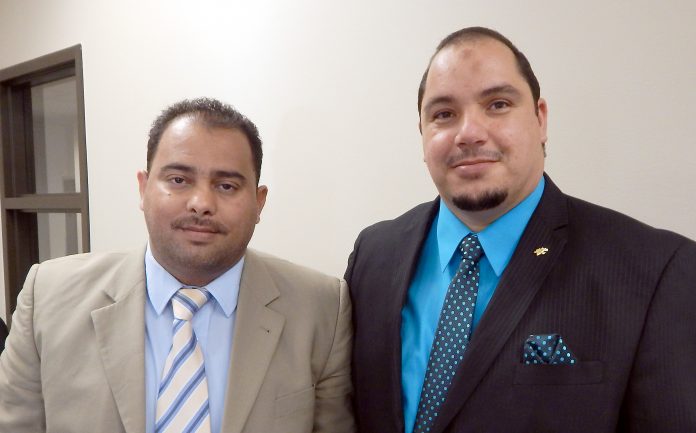
International students share how they earned their Ph.D in 1,003 days
story and photo by James Coburn
Sadeq Al-Fayyadh and Hayder Al-Adrawi, both RNs, just completed their Ph.D in Nursing Education at the Kramer School of Nursing at Oklahoma City University.
“We got our Ph.D in a very limited time frame,” Al-Adrawi said. “So we didn’t have time like other students. Because we have a scholarship, it’s only three years.”
They created techniques by working together in synchronicity to find a way to face challenges. They were facing language barriers and other circumstances during their studies. They are the first students from Iraq, Al-Adrawi said.
“Our people believed in us, so they sent us here,” Al-Fayyadh said.
The two men recently shared with other students the challenges they overcame on their educational journey at Kramer School of Nursing. This way, other international students benefit from their experiences.
Al-Fayyadh and Al-Adawi are both nursing faculty in Iraq and will be returning there to share their knowledge with others. Meanwhile, they will be making their presentation in five different states about their research as students.
“It’s a great opportunity and that’s why the Kramer School of Nursing found something unique in both of us and wanted us to share with them,” Al-Fayyadh said. “It’s really hard to finish a Ph.D. in 1,003 days. We are international students and we got all A’s.”
Carol Mannahan, associate professor, said she was blessed to have them in the first class they took at Kramer and later in the program.
Since Al-Fayyadh and Al-Adawi were Kramer’s first students from Iraq, Kramer faculty was given an opportunity to learn about their culture and learning style.
“They were so gracious and hard working that in the course of four years we have learned so much about the Middle Eastern students,” Mannahan said. “They have tremendous passion for caring for patients and the hard work that they’ve done impressed us all.”
The two men will teach in Iraq. The nursing educational system there has many challenges.
Several other students in the room listening to them at Kramer are international students as well. They were exposed to high-quality methods of research that Al-Fayyadh and Al-Adawi developed to enhance their skills.
“It just occured to me that I would like to have the other international students hear what they have to say,” Mannahan said. “Here they are four years later, Ph.D from a fine university, going back now to make a big difference.”
During their time at Kramer, each of their wives had a baby and one of them had a car accident. So they had all the normal trials and tribulations as migrants outside the culture. Their wives have been away from their families. Al-Adrawi’s mother died while he was here.
“While they have been here they have paved the way for the rest of you,” Mannahan told the other students before Al-Fayyadh and Al-Adawi spoke. “The faculty’s hearts are changed forever in how we interact with the international students. We have gotten to know you as two men instead of two faces from across the world.”
They spoke on Strategies for Success, their personal formula, Al-Fayyadh said. January 9, 2013, was the day they began their journey at Kramer School of Nursing.
“Before that we were preparing ourselves for taking courses,” Al-Fayyadh said. “…Thanks to God first, and to Dr. Mannahan who was our mentor, was and will continue to be our mentor who led us through this life-changing journey.”
Al-Fayyadh said international students face additional challenges in a new environment. Language was their first barrier they overcame, he continued.
They have a degree preparing them for English they obtained in Iraq. But coming to the U.S. was a new world, Al-Fayyadh said.
“The style of the educational system is totally different,” Al-Fayyadh said. “If we compare with what I have in my country, when I came here it was really different.”
The expectation of their sponsor was another challenge, he said. They expected excellent work and nothing less.
“We believe, Hayder and I, we believe we managed to move through this great life changing program with simple techniques,” Al-Fayyadh said.
A doctoral state is good “theater” to push yourself to the limits, he said. It’s an experimental way to see how far someone can reach, he added.
“Thank you Dr. Mannahan for introducing us to the academia and extra curricular activities,” he said. “She suggested that we have a special interest in a certain topic, which was trauma, and nursing working under the shadows of trauma. She said, ‘Well, let’s work on this. Let’s make it something we can share with others.’”
Their work was published many times during their work at Kramer. Al-Fayyadh said part of their success was being aware of the variables and challenges they would face.
“Time management. I learned that from a domestic student,” he said. “Please talk with them. Learn from them. It’s about learning with them and from them.”
He learned about marking calendars with due dates and thought, “This is something new for me,” Al-Fayyadh said.
Another component for Al-Fayyadh was working ahead when he found the time, he said. Al-Fayyadh said they would not read discussion boards on a subject until they made their initial post.
“That was really good. I was confident. I was shaking in the beginning,” Al-Fayyadh said.
It was also beneficial for them to read the materials that their friends were publishing, he said. And their instructors doors were always open for communication, Al-Fayyadh added.
The men would study together and discuss their ideas but never their final conclusion factors needed for their Ph.D.
“The reason for that is to give you a push, whether consciously or unconsciously, that you are not alone in this. There is someone beside you. You are going to sit together and work together, but again, once we finish and decided that it’s all about doing this according to the assignment rules, then we were on our own.”












